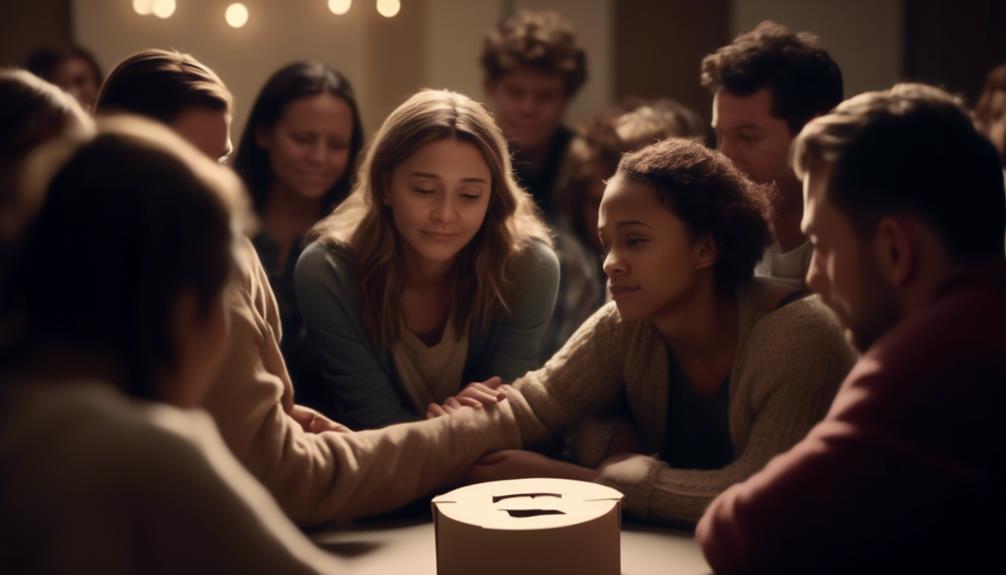Why Social Support Is Crucial During a Breakup

Are you feeling totally lost, completely shattered, and not sure what to do next after a gut-wrenching breakup? I get it, trust me. It's tempting to barricade yourself in a dark room, shut out the world, and wallow in your own misery. But let me tell you something: that's not the way to go. Nope. Not at all.
You see, during this insanely tough time, social support is like a damn life raft. It's the one thing that can keep you afloat in the treacherous waters of heartache. And let me tell you, that's just the tip of the iceberg. There are a gazillion reasons why you absolutely must seek out social support during a breakup.
And if you're willing to dive into them with me, you might just find the strength and resilience to not only survive, but thrive. Trust me, my friend, this is your way out. So let's get to it.
Key Takeaways
- Emotional support and validation from friends, family, or professionals can provide comfort and reassurance during a breakup.
- Coping with loneliness and isolation can be achieved by leaning on your support system, engaging in self-care activities, and considering professional help if needed.
- Seeking advice and guidance from trusted individuals can help gain closure, learn from the experience, and set realistic expectations for future relationships.
- Friends offer unbiased advice, different perspectives, emotional support, and a safe space to process emotions and gain clarity and understanding.
Emotional Validation and Understanding
When going through a breakup, it's crucial to have emotional validation and understanding from those around you. This support helps you navigate the complex and challenging emotions that come with the end of a relationship. Emotional validation is the act of acknowledging and empathizing with someone's feelings, letting them know that their emotions are valid and understandable. It provides a sense of comfort and reassurance during this difficult time.
During a breakup, you may experience a wide range of emotions, such as sadness, anger, confusion, and even relief. It's important to have someone who can listen to you empathetically, without judgment or trying to fix things. This type of empathetic listening allows you to express yourself freely and helps you process your emotions more effectively.
When seeking emotional validation and understanding, it's essential to surround yourself with people who can provide it. Look for friends or family members who are willing to listen without interrupting or offering unsolicited advice. It's also beneficial to seek support from professionals, such as therapists or counselors, who are trained in providing emotional support during difficult times.
Coping With Loneliness and Isolation
Navigating through the feelings of loneliness and isolation after a breakup can be incredibly challenging, but with the right support and coping strategies, you can find solace and connection once again.
It's important to recognize that feeling lonely is a normal part of the healing process, and it's okay to take the time you need to grieve and heal. Here are some coping strategies that can help you manage these difficult emotions and take care of your mental health:
- Reach out to your support system: Lean on your friends and family for emotional support and companionship. Surrounding yourself with loved ones can provide a sense of belonging and alleviate feelings of loneliness.
- Engage in self-care activities: Take time for yourself and engage in activities that bring you joy and relaxation. This can include hobbies, exercising, or practicing mindfulness and meditation.
- Seek professional help if needed: If you find that your feelings of loneliness and isolation are overwhelming and affecting your daily life, consider reaching out to a therapist or counselor. They can provide you with the tools and support you need to navigate through this challenging time.
- Join support groups or communities: Connecting with others who've experienced similar situations can be incredibly comforting and validating. Consider joining support groups or online communities where you can share your feelings and experiences.
- Focus on personal growth: Use this time to focus on yourself and your personal growth. Explore new hobbies, set goals, and work on building a strong foundation of self-love and self-worth.
Seeking Advice and Guidance
If you're feeling lost and uncertain about how to navigate through the aftermath of a breakup, seeking advice and guidance can provide you with valuable insights and support. Going through a breakup can leave you with a myriad of questions and emotions, and reaching out for advice can help you find the closure you need to move on.
When seeking advice, it's important to turn to trusted friends, family, or even professionals who can offer a fresh perspective. These individuals can provide you with guidance based on their own experiences or professional expertise, helping you gain new insights and understand your feelings better.
Finding closure is a crucial step in the healing process after a breakup. Seeking advice and guidance can assist you in understanding what went wrong, identifying your own role in the relationship's demise, and learning from the experience. It can also help you set realistic expectations for future relationships and avoid repeating patterns that led to the breakup.
In addition to providing insights, seeking advice and guidance can offer you emotional support during this challenging time. Talking to someone who understands your pain and can empathize can help you process your emotions and begin the healing process. They can also offer practical advice on how to move on, such as engaging in self-care, exploring new hobbies, or seeking professional help if needed.
Gaining Perspective and Clarity
When going through a breakup, having supportive friends by your side can provide immense comfort and solace. They're there to listen to your thoughts and feelings without any judgment, offering unbiased advice that can help you gain a fresh perspective on the situation.
Supportive Friends Provide Comfort During Breakup
Having supportive friends during a breakup can provide you with the valuable perspective and clarity needed to navigate through this challenging time. They can offer solace by being there for you, listening to your thoughts and feelings, and providing a safe space to express yourself. Their understanding and empathy can help you feel validated and reassured that you aren't alone in your pain.
Supportive friends can also offer reassurance by reminding you of your worth and strengths, helping you see the bigger picture, and encouraging you to focus on self-care and personal growth. Additionally, they can provide different perspectives and insights that can help you gain clarity and make informed decisions about your future.
Their support can be the guiding light that helps you find your way through the darkness of a breakup.
- A listening ear to vent and share your emotions
- Reminders of your worth and strengths
- Different perspectives and insights
- Encouragement to focus on self-care and personal growth
- Emotional support and understanding
Friends Offer Unbiased Advice
Your friends can offer invaluable unbiased advice, helping you gain perspective and clarity during a breakup. When you're going through a difficult time, it's easy to get lost in your emotions and lose sight of what's truly important. That's where your friends come in. They can provide you with a fresh and objective point of view, offering unbiased opinions that can help you see the situation from a different angle.
Sometimes, when we're deeply involved in a relationship, it can be hard to see the bigger picture. But your friends can offer a new perspective, helping you make sense of your feelings and thoughts. They can also provide emotional support, allowing you to vent and process your emotions in a safe space.
Friends Help Process Emotions
As you confide in your friends during a breakup, their unbiased advice and support not only offer a fresh perspective, but also help you gain clarity and understanding of your emotions. Processing your emotions can be overwhelming, but having friends by your side can make a significant difference in your emotional healing journey.
Here's how their friendship support can help you:
- Validation: Friends can validate your feelings and assure you that what you're experiencing is normal and valid.
- Reflection: They can help you reflect on your relationship, prompting you to evaluate what went wrong and what you've learned.
- Empathy: Friends can empathize with your pain, allowing you to feel understood and supported.
- Encouragement: They can provide words of encouragement, reminding you of your strengths and offering hope for the future.
- Perspective: Friends can offer a fresh perspective on your situation, helping you see things from different angles and gaining clarity.
With the help of your friends, you can navigate through your emotions and find the strength to heal and move forward. Remember, you're not alone in this journey.
Rebuilding Self-Esteem and Confidence
Rebuilding your self-esteem and confidence after a breakup can be a challenging journey, but with the right support and mindset, you can emerge stronger and more resilient than ever before.
It's normal to feel a blow to your self-worth and to experience insecurities during this time. However, it's important to remember that your breakup doesn't define you.
To start rebuilding your self-worth, focus on self-care. Take time for yourself and engage in activities that bring you joy and fulfillment. Surround yourself with positive influences and distance yourself from negativity. Practice self-compassion and remind yourself that you're deserving of love and happiness.
Overcoming insecurities may take time, but it's possible. Challenge negative thoughts and replace them with positive affirmations. Take small steps outside of your comfort zone to build confidence and prove to yourself what you're capable of. Celebrate your achievements, no matter how small, and recognize your strengths.
Seeking support from friends, family, or a therapist can be incredibly helpful during this process. They can offer guidance, encouragement, and a fresh perspective. Remember, you aren't alone in this journey, and there are people who care about your well-being.
Rebuilding self-esteem and confidence after a breakup is a transformative process. Embrace the opportunity to grow and learn from the experience. With time, patience, and self-compassion, you can build a stronger foundation of self-worth and overcome any insecurities that may arise.
Processing and Expressing Emotions
During the process of rebuilding your self-esteem and confidence after a breakup, it's important to acknowledge and effectively process your emotions. This can be a challenging and overwhelming task, but expressing vulnerability and seeking professional help can greatly aid in this process.
Here are a few strategies to help you navigate through your emotions:
- Give yourself permission to feel: Allow yourself to experience the full range of emotions that come with a breakup. It's natural to feel sadness, anger, confusion, and even relief. Embracing these emotions is an important part of healing.
- Journaling: Writing down your feelings can be a powerful way to process and release them. It provides a safe space for self-reflection and allows you to gain insights into your emotions.
- Talk to a trusted friend or family member: Sharing your feelings with someone you trust can provide comfort and support. It can help you gain perspective and feel less alone in your experience.
- Seek professional help: Sometimes, processing emotions on your own may not be enough. Consider reaching out to a therapist or counselor who can provide guidance and support tailored to your specific needs.
- Engage in self-care activities: Taking care of yourself physically, mentally, and emotionally is crucial during this time. Engage in activities that bring you joy, whether it's exercise, meditation, pursuing hobbies, or spending time with loved ones.
Creating a Sense of Belonging and Community
When going through a breakup, it can feel isolating and lonely. However, creating a sense of belonging and community can help you navigate this challenging time.
Building emotional connections with others who've experienced similar situations can provide a support system where you feel understood and validated.
Sharing experiences and empathizing with others can help you feel less alone and give you a sense of belonging.
Building Emotional Connections
Building emotional connections is essential for creating a sense of belonging and community during a breakup. When going through such a challenging time, it's crucial to surround yourself with people who can provide support and understanding. Here are five ways to build emotional connections during a breakup:
- Open up and share your feelings with trusted friends or family members.
- Seek professional help, such as therapy or counseling, to work through your emotions and gain valuable insights.
Engage in activities that promote self-reflection, like journaling or meditation, to develop a deeper understanding of yourself.
- Join support groups or online communities where you can connect with others who are going through similar experiences.
- Practice empathy and actively listen to others, as this fosters a sense of connection and creates a supportive environment.
To foster a sense of belonging and community during a breakup, it's important to connect with others who've shared experiences and can offer empathy and support. Shared experiences create a sense of understanding and emotional validation, reminding you that you aren't alone in your struggles.
When you feel lonely and isolated, seeking advice and guidance from those who've been through similar situations can provide you with a different perspective and clarity. It offers comfort knowing that there are others who've overcome similar challenges and can offer unbiased advice.
Connecting with others who've gone through similar experiences can help you process your emotions and rebuild your self-esteem and confidence. Expressing your emotions in a safe and supportive community can provide a sense of belonging and create strong emotional connections that can aid in your healing journey.
Frequently Asked Questions
How Long Does It Typically Take to Fully Process and Heal From a Breakup With the Support of Friends and Family?
It typically takes time to fully process and heal from a breakup with the support of friends and family. Setting boundaries is crucial during this healing process, and self-reflection plays a significant role in your journey towards healing.
Are There Any Specific Techniques or Strategies That Can Help Someone Cope With Feelings of Loneliness and Isolation After a Breakup?
You don't have to face loneliness and isolation after a breakup alone. There are coping techniques that can help you overcome these feelings. Reach out to friends, find new hobbies, and practice self-care. You'll get through this.
Seeking advice and guidance from others during a breakup can provide valuable support. Joining support groups can offer benefits like finding empathy and comfort from others who understand what you're going through.
What Are Some Effective Ways to Gain Perspective and Clarity on the Reasons Behind a Breakup?
Are you struggling to gain perspective and clarity on the reasons behind your breakup? Seeking support from others can provide valuable insights, helping you gain closure and find your self-worth in the process.
How Can Someone Rebuild Their Self-Esteem and Confidence After a Breakup, With the Help of Social Support?
You can rebuild your self-esteem and confidence after a breakup with the help of social support. Surround yourself with friends and loved ones who uplift you, engage in self-care practices, and focus on rebuilding relationships with yourself and others.










